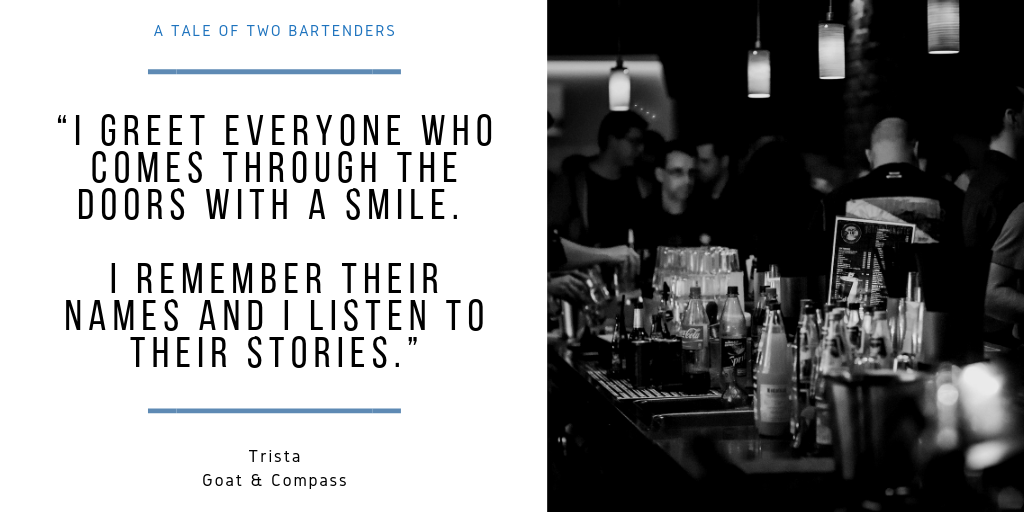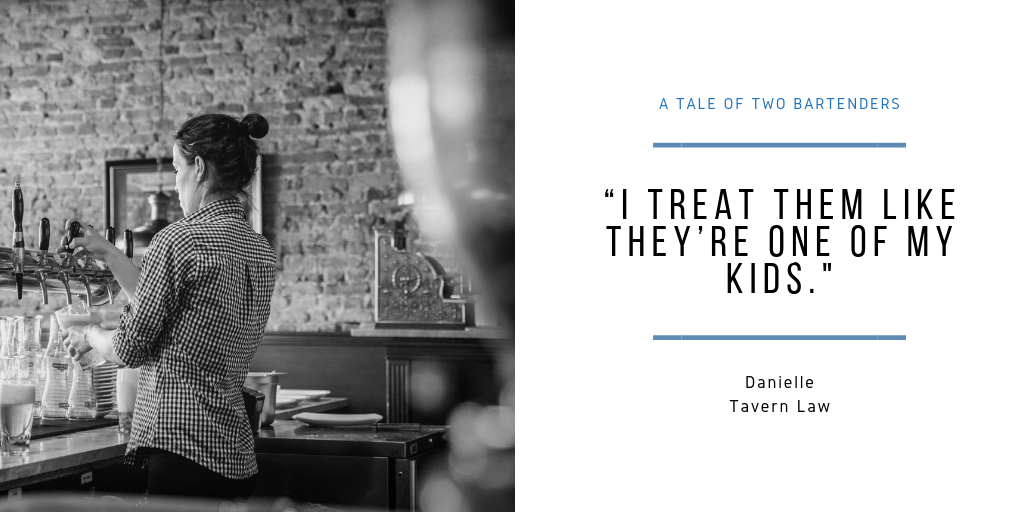This is a tale of two bartenders.
My wife and I were visiting the suburb of a city that shall remain nameless (rhymes with Schmicago) and decided we wanted to check out the local bar scene. Before we ventured into the great unknown after what felt like hours of thumbing through Yelp reviews, we stumbled upon a lovely establishment with pretty stellar ratings. With great anticipation—and by anticipation, I mean thirst—we made our way through the old oak threshold and found ourselves belly-up at the bar. My wife and I love shooting the breeze with bartenders, especially in a new town. They are (usually) a wealth of knowledge and eager to help make our experience as unique and exciting as possible. This particular venture, however, was quite the opposite.
We were the only people in this bar, yet somehow, it still took the bartender several minutes to even acknowledge our existence. When she finally did decide to make human contact, she was cold, short and gave the impression that she would rather be next in line for tickets to a live reading of Weird Al Yankovic’s autobiographical memoir than waiting on us. Our impressions of the bar, food, drinks, and even the neighborhood were negatively impacted by this interaction.
Now, I did say that this is a tale of TWO bartenders. After leaving the depression sinkhole that was the first bar, we popped into another spot in an adjacent neighborhood.
It was a night and day difference.
As we sat, we were immediately greeted by a smiling, eager and confident bartender. She asked where we were from, as she hadn’t seen us before. She listened intently, made drink recommendations and even offered up other places for us to stop into before we left town.
Conversation flowed like the salmon of Capistrano.
We left that bar feeling that we not only had positive vibes from the bartender, but also from the bar and the neighborhood in general. It was a complete contrast to our first experience.
What was the make or break variable at each bar? The interaction—or lack thereof—with the bartender. How do you think the tip varied between the first bar and the second? How do you think our impression of not only the bartender, but the bar itself and the neighborhood were impacted by the experience?
The concept of building rapport is so often overlooked—but this experience reminded me how critical it is to the success of the interaction. Let’s consider how this has a direct application to the professional interview/interrogation experience.
Bartenders are some of the best at building rapport with strangers, mainly because their livelihood depends on it. Whenever I am trying to improve in any facet of my life, I always look to someone better than me to be my guide.
In this case, I’m lookin’ at you, bartender #2.
I decided to take it upon myself to get some answers firsthand. I wanted to learn what the most skillful bartenders had to say about how they, well, talk to people. This was one of the most daunting and overwhelming research endeavors I had ever pursued as it required me to go to my favorite watering holes in Wilmington, NC, drink beer and bourbon, and talk to strangers.
Fortunately, I made it out safe and sound. Not to get too Law & Order on you, but…
These are their stories:

These wise words come from one of the staple bartenders at The Goat & Compass, Trista. It’s by no mistake that Trista has been voted best bartender in Wilmington, NC two years in a row. People like her. Trista doesn’t have a magical equation for getting people, both locals and strangers alike, to feel right at home. She presents a calm, confident attitude and listens to what they have to say.
There’s a lot to be said about this approach. Think about how these simple principles can carry over into the interview room. When someone sits down across from us, they will be just as pleased (if not more so) when they are met by a kind and empathic individual who conveys a genuine willingness to listen to what may be going on in their life.
Trista further mentioned that the trick of listening to the stories people tell is to find something you can relate to in their story and then expand on it with your own similar experience. This plays right into the concept of likeability—people like people like them. In our venue, when you ask the individual sitting across from you, “So, tell me about yourself,” pay attention to areas where you may share similar experiences and use those to expand the conversation.

After leaving the Goat & Compass (my absolute favorite dive in Wilmington), my wife and I ventured into Tavern Law—a rustic pub settled just a couple of blocks off the river. Danielle is one of the owners of this gem and also one of the reasons the bar is so successful. What Danielle meant by, “I like to treat them like they’re one of my kids,” was that she takes a confident, but empathic approach to all patrons. Danielle says that displaying confidence as a bartender allows her to maintain control of the interactions and not the other way around. She also discussed the importance of listening with an empathetic ear. This allows people to feel as though she not only cares to learn more about them, but also that she can relate to them and their experiences on some level.
Confidence in the interview setting is critical to being successful. Do you think the person sitting across from you can notice if you are unsure of yourself? Do you think they can tell if they will be able to get away with pulling the wool over your eyes if they pick up the slightest sense of insecurity? Absolutely. As professionals in this industry, our confidence in these settings needs to be the constant undertone throughout the entire discussion. The ability to maneuver through a conversation with confidence will make the process of breaking the ice a walk in the park.
Listening to people with an empathetic ear doesn’t only work for bartenders. This is a skill set everyone can utilize. When we can show others that we understand whatever it is they may be going through, it allows them to feel a sense of comfort and trust in us as the listener. Comfort and trust are the cornerstones to the rapport-building process.
Other themes I picked up from my discussions were:
“I make the other person the MOST IMPORTANT party in the conversation.”
“I speak slowly.”
“I make an effort to always be smiling.”
“It sounds simple, but I try to make good eye contact.”
“Once I learn their name, I use it.”
“I try to talk to newcomers the same way I would with friends I’ve had for years.”
All of these tips can easily be applied to our world and will likely elicit the same level of success. It’s so easy for us—either as new interviewers or as seasoned professionals—to get caught up in what can be an awkward interaction between us and a stranger.
But remember, they are…wait for it…just people. People who have been through the ups and downs of life. No matter how different you may THINK they are, you can find some thread of common ground to make that connection. All you need to do is ask, then sit back and listen.
In the story from the beginning—remember how I felt leaving those interactions? My opinion of the bartender, bar and ultimately even the neighborhood were impacted merely by the conversation or lack thereof in each establishment. This isn’t a far cry from our own professional circumstance. If we have an unfavorable interaction with someone in the interview setting, do you think that could impact their opinion of your professionalism, your department, and even your company/agency?
A differentiating skillset in this profession is having the ability to CONNECT with others. Whether those “others” are your peers, family, friends or the people who find themselves sitting in a chair four feet across from you, to be effective you still need to be able to make the connection.
Take time to pay attention to those who are savvy at navigating their way through a conversation and look for the common threads. I guarantee you can find ways to infuse those methods into your next interview successfully.
If you happen to be reading this whilst sitting at a bar—shut your laptop, put away your phone and talk to someone.
Your job, too, depends on it.
Cheers!
Tony Paixão, CFE, CFI, is a Certified Forensic Interviewer, speaker and consultant for Wicklander-Zulawski & Associates, Inc. (WZ). Tony has served in a variety of roles both in the public and private sectors. He is also an active member of the International Association of Interviewers (IAI). Tony has conducted investigations and interrogations for hundreds of cases ranging from retail fraud to homicide to sexual assault and employee relations matters.





May 3, 2019, 6:10 pm
This article was dead on point. I am a 6’4 235 lb farmboy from Kansas, I have always had jobs that were military/law enforcement based. In doing that I have created a perception of myself that I am none empathetic which is not the truth. I understand that my current role in dealing with associates that have made a mistake that may cost them their job and after the process is complete it results in me being given the title of Grim Reaper but I do relate to some of their struggles. I think finding a connection while interviewing is as important as getting a non-verbal affirmation to a question you have asked. Thank you for this article.
May 3, 2019, 7:13 pm
Thank you, Johnny. Great insight!
October 18, 2019, 6:48 am
Smile is contagious. It is necessary for all kinds of works that need interaction. It gives a good vibe to everyone. Every employee should have a great communication skills. For a more welcoming place for clients.
April 9, 2020, 5:25 pm
I’ve been surfing online more than three hours today, yet I never found any interesting article like yours.
It is pretty worth enough for me. Personally, if all site
owners and bloggers made good content as you did, the web
will be much more useful than ever before.
July 17, 2020, 12:06 am
Hey there, I think your website might be having browser compatibility issues.
When I look at your blog site in Safari, it looks fine but when opening in Internet Explorer,
it has some overlapping. I just wanted to give you a
quick heads up! Other then that, terrific blog!